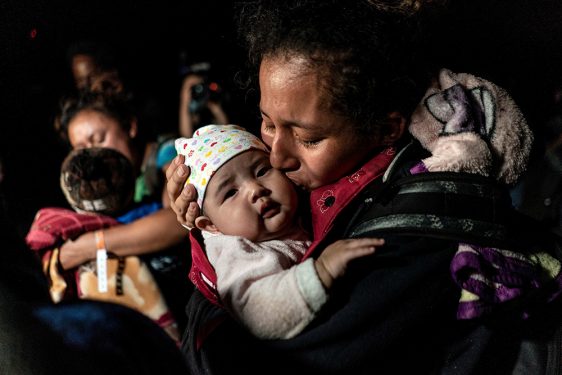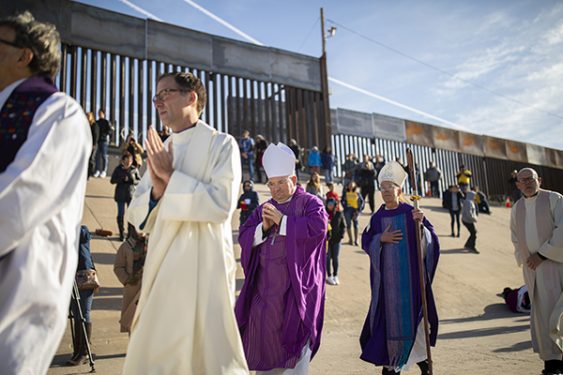
MANHATTAN — While Democrats and Republicans are trading accusations for who is to blame for the present crisis at the U.S.-Mexico border, one U.S. bishop says enough is enough.
“It’s extremely important that we find ways to transcend the partisanship. You know, instead of politicizing the issue can we for once Christianize the issue? Can we say, what would be a truly loving Christian response?” Bishop Mark Seitz of El Paso told The Tablet.
[Related: Once Again, Catholic Agencies Step in to Help Minors at the Border]
“Jesus tells us we’re supposed to love those that hate us. So, can we Christianize the situation and begin to live in a way that makes the gospel real? I think then we would come a long way to resolving these problems and we would be assured of the help of God,” he continued.
Faith organizations along the border continue to provide humanitarian relief to migrants and speak out against what’s widely considered a broken system.
One constant complaint is Title 42.
The Trump administration policy instituted last year, and not rescinded by President Joe Biden, allows U.S. authorities to expel migrants on the grounds of public health, limiting their legal right to seek asylum.

The Biden administration has until April 21 to renew the policy. In March, U.S. Customs and Border Protection expelled 103,900 individuals according to Title 42, according to its website. Asylum seekers continue to flee their country of origin because of various factors that include violence, natural disasters, food insecurity and poverty.
In El Paso, Bishop Seitz told The Tablet he’s witnessed migrants flown in from the Brownsville area and subsequently “ushered” back across the bridge to Juarez, Mexico — a place they’ve never been before — under the policy.
“They were just in utter despair,” the bishop said. “Young families with babies and children saying: What do I do now? I have no money. I have nothing but the clothes they allowed me to keep on my back.”
“And then the strange place. What they don’t know at first, but what they’ll find out, is the shelters are pretty much full and we’re just praying that people aren’t going to be left out on the street with their babies. That’s what I witnessed in Juarez,” he continued.
Dylan Corbett, executive director of the Hope Border Institute in El Paso, said the city is ready to meet the challenge of welcoming immigrants if the asylum seekers were allowed to stay, but the situation is bleak on the Mexican side of the border.
“The U.S. government is planting the seeds of a real crisis situation in Ciudad Juarez unnecessarily and causing real trauma. Juarez does not have the resources to provide hospitality to these migrants and to a city which has a real reputation for being dangerous for vulnerable people like migrants,” Corbett said.
“I’ve witnessed the U.S. Border Patrol forcibly return people. They walk them over the bridge, they come over the bridge, and I’ve seen how traffickers and smugglers have preyed on this population,” he said.
In Nogales, Arizona, Kino Border Initiative executive director Joanna Williams has also seen the policy at work. Williams said that migrants are detained in the Arizona desert and immediately expelled to across the border to Nogales, Mexico.
Corbett said that the policy is exacerbating other challenges at the border. For example, he said it’s contributing to the rise of unaccompanied minors because those “who come to the border are coming with their family who have to make the terrible choice of sending their children across the border.”
Williams called on the Biden administration to “develop a better plan for how to unwind Title 42 and robustly restore access to asylum at the border instead of just putting out radio [advertisements] and telling people not to come. If you’re not giving people alternatives, a radio ad is not going to influence a decision.”
She also wants Americans to exhibit more empathy for migrants and the situations in which they have found themselves.
She added for that to happen, people need to hear their stories.
Williams told The Tablet about a Guatemalan fleeing extortion from criminal gangs.
“He said, ‘Well my mom has a house, and we have one room in the house. One small room in which the two of us sleep, our baby sleeps between us because our daughter has the bed and then we have a curtain that our two older kids sleep on the other side of the curtain. And that’s where we stay and where we’ve stayed for a year’,” Williams recalled.
“He said, ‘I want to be able to give something more to my family. More than this room and more than this food insecurity, but because I’m paying off the gangs because they’re extorting me, there’s no way for me to save’,” she continued.
Immigrant advocates also object to the use of the word “crisis” at the border.
Bishop Robert McElroy of San Diego, who presided over an Easter Mass for 1,500 unaccompanied minors in the diocese flown in from Texas, said that the situation deserves a word bigger than challenge but less than crisis. It’s something he pondered recently on a call with the other U.S. border bishops.
“(Crisis) signifies a situation at the border that threatens to engulf our country in some major way. That’s not true. That’s my reason for not using the word crisis. Because it’s not factually correct,” Bishop McElroy said.
Bishop Seitz acknowledged there is a surge in asylum seekers, but said the word crisis leads people to assume “drastic measures are needed and human rights can be set aside.”
